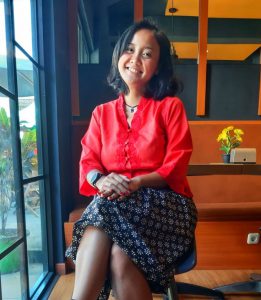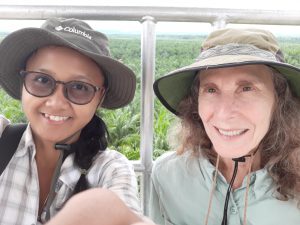By Katrina Rossos
“When I saw that Indonesia is one of the richest biodiversity countries in the world, I felt that I needed to do something,” Sisil Putri enthusiastically explained over a video call, a fire behind her eyes. And she has taken her passion, work experience, and education to become a successful conservation project manager in her home country.
Putri graduated from University of Florida with a master’s degree in wildlife ecology and conservation in spring 2019. She was co-advised by Dr. Lyn Branch and Dr. John Blake.
Originally from Jakarta, located on the island of Java, Putri grew up in a traditional Indonesian city household – removed from the wild jungles for which the Southeast Asian country is renowned. So, she was not introduced to the wonders of the natural world until she was an undergraduate at the University of Indonesia.
“When I studied at university in biology, I got exposed to conservation for the first time at the age of 17, and I fell in love,” she said.
 Putri studied animal behavior and primate conservation as an undergraduate student, focusing on Javan slow loris (Nycticebus javanicus), an endangered species in Indonesia. After she graduated with her bachelor’s degree, Putri worked for three years at University of Indonesia’s Research Center for Climate Change as a junior researcher.
Putri studied animal behavior and primate conservation as an undergraduate student, focusing on Javan slow loris (Nycticebus javanicus), an endangered species in Indonesia. After she graduated with her bachelor’s degree, Putri worked for three years at University of Indonesia’s Research Center for Climate Change as a junior researcher.
She came upon the opportunity to come to the United States for graduate school when she found a natural resources fellowship. In 2015, The Center for International Forestry Research (CIFOR), an Indonesian nonprofit research institution, teamed up with U.S. Agency for International Development (USAID) to create the CIFOR-USAID Indonesia Forestry Fellowship Program. This fellowship provides Indonesian residents with the opportunity to receive a master’s degree in natural resource disciplines from U.S. universities. Interested in continuing her education in wildlife, Putri applied and was accepted. Of four universities to choose from, she chose to attend University of Florida given its exceptional reputation in wildlife ecology, which was her core interest.
Earning Her MS at University of Florida
Putri chose Branch as her advisor because she expected her students to create their own research track, rather than simply following a “canned project” within her lab. Initially, Putri wanted to continue researching slow loris. However, Branch helped her realize the importance of considering implications at the landscape level over species-focused research in terms of conservation.
“The behavior of the species is important, obviously, but when you think about the landscape and policy that includes in there you cannot just see one species’ perspective, you also have to see the ecosystem of the landscape, and that makes things more exciting and complicated,” Putri said. “It was really hard, but it was really exciting!”

Her thesis focused on mammal distribution within “high carbon stock”-designated forest reserves on palm oil plantations. Palm oil is an efficient crop that produces more oil per land area than any other vegetable harvested for oil. However, palm oil plantations deforest incredibly biodiverse ecosystems, eliminating habitat for endangered species. For a palm oil company in Indonesia to receive a sustainable license, they must have a compensatory forest reserve. So, Putri’s research examined how effective these forests are for mammal conservation.
“When I worked with Lyn it changed my perspective into a wider perspective that helped me to be where I am at right now, and I am really grateful for that. So, I’m having a bigger impact,” Putri said.
She completed her master’s degree in three years, with two years in Gainesville and 9 months conducting field work in Indonesia. After graduating UF, Putri returned to Indonesia, and is currently living in Bali.
Improving Wildlife Education for Indonesian Children
In 2020, Putri received a $15,000 grant from the U.S. Embassy Young Southeast Asian Leaders Initiative (YSEALI) — Seeds for the Future. The grant funding supported the improvement of conservation education through interactive teaching materials and capacity building for undergraduates and environmental educators in North Sulawesi. Despite having some of the richest biodiversity in the world, Indonesia does not have readily-accessible books and learning materials on the plants and animals of the country.
“I grew up without this privilege, I did not have books about conservation, and if you come to the book store in Indonesia there are a lot of books about animals, but mostly African animals—not Indonesian animals,” she explained. “So, I don’t have the kind of material, mostly it’s imported and expensive. It’s not for everybody, so it’s a privilege to read about animals—and I’m in the center of this biodiversity, but I don’t have this opportunity.”
Inspired to fill this gap in wildlife education, Putri applied for the YSEALI grant to create these informative resources for children of varying ages, including comics and storybooks. The project also helps train young adults in conservation or forestry. These learning materials are supplied to Indonesian nonprofit organizations that have pre-existing programs and workshops centered around teaching children about local wildlife.
Wildlife Conservation Project Management
Presently, Putri is working as the Conservation Project Portfolio Officer for the Ecosystems Outcomes Team at Lestari Capital, an environmental start-up business that connects financing sources to conservation and restoration projects through corporation partnerships. Lestari ensures businesses meet their country’s sustainability standards by linking them with nonprofit organizations that understand wildlife conservation management and landscape restoration and overseeing these long-term financial commitments.
“So we’re in the middle of it between them, helping the company get their liabilities to get their sustainability certifications and help the project in preparation and with the reporting,” Putri explained.
A great deal of the project management Putri is doing at her current job she learned from her master’s work and Branch’s Conservation Planning course at UF.
“I really didn’t think I would end up here—working for a company,” Putri said. “I thought I would be a researcher focused on species, or a researcher focused on landscape, and now I’m focused on project management and apparently I love it – it’s like talking with people—I love it. I am not a researcher anymore, but I think I’ve found what I’m good at.”
 0
0

